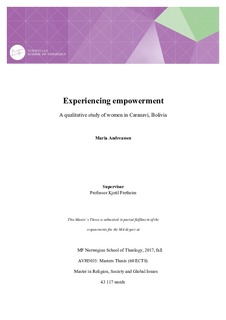| dc.description.abstract | Empowering women and achieving gender equality is one of the most crucial concerns of the United Nations Millennium Development Goals, and the Sustainable Development Goals from 2015. From a political and human rights perspective, women’s participation and women’s rights are of paramount importance in order to realise the Millennium Development Goals. Empowerment is needed because of the presence of unequal power relations, and it includes the processes by which people who have been denied the ability to exercise agency, autonomy or choices, to gain such abilities.
The purpose of this thesis is to illuminate the term empowerment and look at how the women, who have participated in development aid projects, experience empowerment. This is a qualitative study, where I have used semi-structured interviews. The ten informants are participating in courses and women’s groups initiated by the Norwegian Mission Alliance in Bolivia, Caranavi. This thesis will be taking a holistic approach defining women’s empowerment as a process, whereby women’s lives are transformed from a state where they have little or no power, to a position where they have an increased self-confidence to make their own decisions.
Prior studies indicate that empowerment play a central role in the development debate, however empowering others is not something an outside force can easily influence. This thesis aims to understand the empowerment process regarding how the women experience empowerment. In addition, the research examines whether empowerment is easily implemented and the effects of change in power-relations. The most central theory used in this thesis is Jo Rowlands theory of empowerment and gender analysis of power relations. My findings indicate that many of the informants experienced an increased ability to solve and improve their conditions. Furthermore, the informants shared of an increase in self-esteem, including improvements within their family relations and in their local society. This thesis will provide a first-hand knowledge and an understanding of how empowerment can be experienced. | nb_NO |
